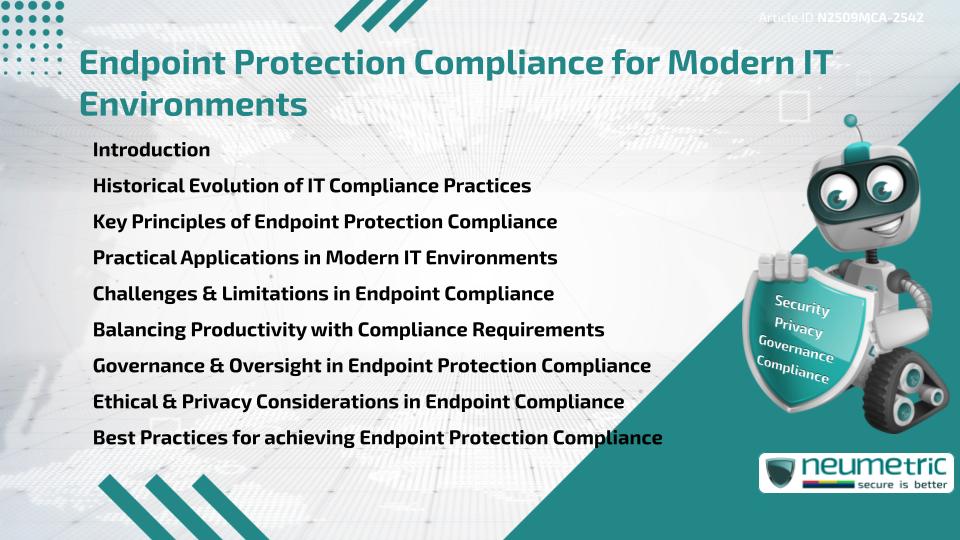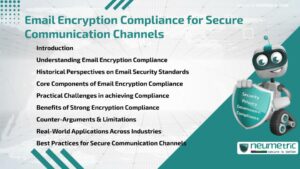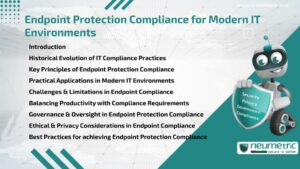Table of Contents
ToggleIntroduction
Endpoint Protection Compliance is a critical element in safeguarding modern IT environments. It ensures that devices such as laptops, smartphones & servers meet Security & Regulatory Standards while protecting Sensitive Data from Cyber Threats. By enforcing Policies, Monitoring Endpoints & aligning with Frameworks such as ISO & NIST, Organisations can reduce Risks & foster Trust. Endpoint Protection Compliance is not just about technology but also about Governance, Ethics & User responsibility.
Historical Evolution of IT Compliance Practices
The roots of Endpoint Protection Compliance can be traced back to the early 2000s, when regulations such as the Sarbanes-Oxley Act & HIPAA began to reshape how Organisations handled Sensitive Information. As remote work & mobile devices became common, traditional perimeter security proved insufficient. This shift created the need for comprehensive Endpoint Compliance practices that extended beyond firewalls to every connected device. Today, frameworks like the NIST Cybersecurity Framework & ISO/IEC 27001 emphasise Endpoint security as a cornerstone of Compliance.
Key Principles of Endpoint Protection Compliance
Endpoint Protection Compliance rests on several foundational principles:
- Confidentiality: Ensuring that data on Endpoints remains protected from unauthorised access.
- Integrity: Safeguarding against tampering or malicious changes to Endpoint systems.
- Availability: Ensuring Endpoints remain secure without hindering productivity.
- Accountability: Defining clear responsibilities for Endpoint security & Compliance monitoring.
These principles combine to create resilient IT environments that withstand Threats while meeting Regulatory obligations.
Practical Applications in Modern IT Environments
Endpoint Protection Compliance has wide-ranging applications:
- Healthcare: Ensures medical devices & Patient Data systems comply with strict Privacy laws.
- Finance: Protects Customer transactions & sensitive Financial data from Breaches.
- Education: Safeguards Student Records while allowing flexible device use in schools.
- Corporate IT: Enforces secure access Policies for remote & hybrid workers.
Each of these use cases highlights how Endpoint Compliance strengthens organisational resilience while enabling daily operations.
Challenges & Limitations in Endpoint Compliance
Implementing Endpoint Protection Compliance is not without hurdles. Organisations face challenges such as managing diverse device ecosystems, ensuring updates & patches are applied & preventing User circumvention of Security Measures. Additionally, global businesses must navigate varying regulations, from GDPR in Europe to state-level Privacy laws in the United States. These complexities can make Endpoint Compliance resource-intensive & difficult to sustain consistently.
Balancing Productivity with Compliance Requirements
One key concern is whether Compliance Requirements slow down business productivity. Strict Endpoint controls may limit User flexibility, leading to frustration. However, when designed effectively, Compliance frameworks balance protection with usability. For example, Multi-factor Authentication enhances Security without significantly disrupting workflow, much like seatbelts protect drivers without stopping them from driving efficiently.
Governance & Oversight in Endpoint Protection Compliance
Governance plays a crucial role in ensuring that Endpoint Protection Compliance is not just a Technical Checklist but a strategic initiative. Oversight from Compliance officers, IT Auditors & Security Committees helps maintain alignment with both internal standards & external regulations. Regular Audits & independent Assessments strengthen Trust while uncovering Vulnerabilities before they cause harm.
Ethical & Privacy Considerations in Endpoint Compliance
Endpoint Protection Compliance raises important Ethical & Privacy questions. Monitoring User devices can create tension between organisational security & individual rights. Striking the right balance requires transparent Policies & clear Communication with Employees. Ethical Compliance ensures that Security practices do not cross into invasive surveillance, preserving trust between Organisations & users.
Best Practices for achieving Endpoint Protection Compliance
Organisations can achieve stronger Endpoint Protection Compliance by:
- Conducting regular Endpoint Audits & Vulnerability scans.
- Applying Encryption & secure Access Controls across devices.
- Training users on Compliance responsibilities & Security Awareness.
- Engaging with Regulators & industry groups to stay updated on evolving requirements.
- Documenting Compliance processes clearly for Accountability & Transparency.
These practices ensure that Compliance is sustainable, effective & integrated into the organisational culture.
Takeaways
- Endpoint Protection Compliance safeguards devices, data & systems in modern IT environments.
- Historical regulations shaped today’s Endpoint practices by extending beyond perimeter security.
- Challenges include resource demands, diverse regulations & balancing security with productivity.
- Governance, Ethical considerations & Best Practices strengthen Compliance & Trust.
FAQ
What is Endpoint Protection Compliance?
It is the process of ensuring that all devices in an IT environment meet Security & Regulatory requirements.
Why is Endpoint Protection Compliance important?
It protects Sensitive Data, prevents Breaches & ensures Organisations meet Legal & Industry Standards.
Which industries rely most on Endpoint Protection Compliance?
Healthcare, Finance, Education & corporate IT are among the most reliant sectors.
Does Endpoint Protection Compliance affect User productivity?
If poorly implemented, yes. But with thoughtful design, Compliance can secure systems without slowing down users.
How does Governance support Endpoint Protection Compliance?
Governance provides Oversight, Accountability & independent Auditing to maintain consistent Compliance.
What are the ethical challenges of Endpoint Protection Compliance?
The main challenges involve balancing Security Monitoring with respect for User Privacy & Trust.
How can Organisations improve Endpoint Protection Compliance?
They can improve Compliance through Audits, Encryption, Training, transparent Policies & Regulatory engagement.
Need help for Security, Privacy, Governance & VAPT?
Neumetric provides organisations the necessary help to achieve their Cybersecurity, Compliance, Governance, Privacy, Certifications & Pentesting needs.
Organisations & Businesses, specifically those which provide SaaS & AI Solutions in the Fintech, BFSI & other regulated sectors, usually need a Cybersecurity Partner for meeting & maintaining the ongoing Security & Privacy needs & requirements of their Enterprise Clients & Privacy conscious Customers.
SOC 2, ISO 27001, ISO 42001, NIST, HIPAA, HECVAT, EU GDPR are some of the Frameworks that are served by Fusion – a SaaS, multimodular, multitenant, centralised, automated, Cybersecurity & Compliance Management system.
Neumetric also provides Expert Services for technical security which covers VAPT for Web Applications, APIs, iOS & Android Mobile Apps, Security Testing for AWS & other Cloud Environments & Cloud Infrastructure & other similar scopes.
Reach out to us by Email or filling out the Contact Form…





